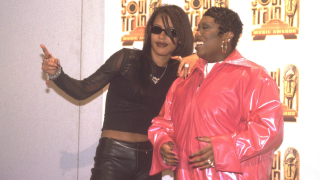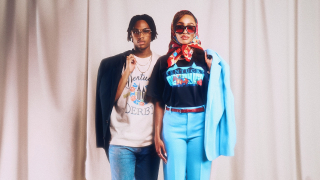There’s something up with the Knowles sisters. In April, when Beyoncé unleashed her sixth studio album, Lemonade, and the accompanying short film, Black women across the Diaspora basked in its unapologetic Blackness. Though Bey had been becoming more vocal on social issues, many credited her seemingly newfound wokeness to her spunky, outspoken younger sister Solange, who has never held her tongue. But after listening to Solange’s latest effort, A Seat at the Table, it’s clear the Knowles girls get it from they mama.
“I think part of it is accepting that it’s so much beauty in being Black. And that’s the thing that I guess I get emotional about, because, I’ve always known that. I’ve always been proud to be Black. Never wanted to be nothing else, loved everything about it,” Tina Lawson says on her younger daughter’s new album. “It’s such beauty in Black people, and it really saddens me when we’re not allowed to express that pride in being Black. And that if you do then it’s considered anti-white. No, you’re just pro-Black. And that’s okay.”
On Lemonade, Beyoncé wrapped her pro-Blackness in a tale of love, betrayal, and commitment. She sang about loving her man’s Negro nose and her daughter’s baby hair and afros, and served up powerful images of the Black South against the words of Somali-British poet Warsan Shire. But Bey never explicitly told her White fans to stand down, what she was brewing wasn’t really for them. She didn’t have to, though, we knew what was up. But on A Seat at the Table Solange makes it clear this project is strictly for us—Black folks across the globe who are tired of explaining ourselves, feeling uneasy, and altering who we are to make White people more comfortable.
And in case people had any doubts Solange was making a Black-ass album for Black people, she cleared it up on “F.U.B.U.”
All my n****s let the whole world know
Play this song and sing it on your terms
For us
This sh-t is for us
Don’t try to come for us
The song closes with a not-so-subtle jab at those who appropriate Black culture without loving Black people:
This sh-t is from us
Get so much from us
Then forget us
Don’t feel bad if you can’t sing along
Just be glad you got the whole wide world
This us
This sh-t is from us
Some sh-t you can’t touch
In another interlude—which are woven throughout the album to tell a story about inequality, Black genius, and triumph—Solange, Kelly Rowland, and Nia Andrews sing, “Don’t let anybody steal your magic/But I got so much, y’all/You can have it.”
The message is clear: Black people are creators, innovators, and resilient AF. No matter how much this world has thrown at us, we remain and continue to make art that influences the world.
As Master P says on “This Moment,” “If you don’t understand us and understand what we’ve been through, then you probably wouldn’t understand what this moment is about. This is home. This is where we’re from. This is where we belong.”
It’s fitting that A Seat at the Table arrives just as I’m rereading James Baldwin’s The Fire Next Time and diving into Jesmyn Ward’s anthology, The Fire This Time. Like the album, both books grapple with what it means to be Black in America. Though at times it’s difficult, all three works urge Black folks to love ourselves, to be ourselves, and never buy into who the world says we are—broken, violent, victims, perpetrators.
“You can only be destroyed by believing that you really are what the White world calls a nigger,” Baldwin writes in his classic tome. “I tell you this because I love you, and please don’t you ever forget it.”
Ward, who said Baldwin’s book helped her deal with the murder of Trayvon Martin and with the deaths of so many others, echoes his thoughts.
“I believe there is power in words, power in asserting our existence, our experience, our lives, through words,” she writes. “That sharing our stories confirms our humanity.”
Similarly, Solange’s A Seat at the Table recounts hard truths—of feeling othered, of feeling slighted, of existing and thriving despite systematic challenges—but it also tells our story.
The album is a love letter to Black folks who are forced to live in a hostile world. Because, as Master P perfectly sums up toward the end of A Seat at the Table, “Black kids have to figure it out. We don’t have rehabs to go to. You gotta rehab yourself. But for us, you can’t pull the plug on us and tell us it’s over. Not me.”
Not any of us.













